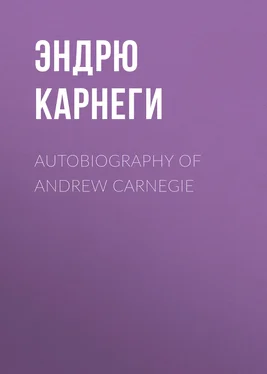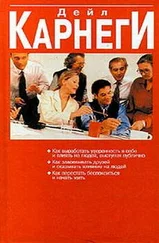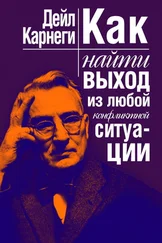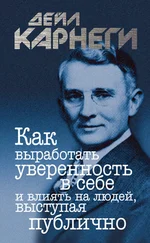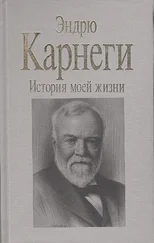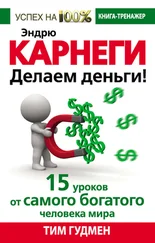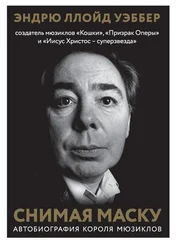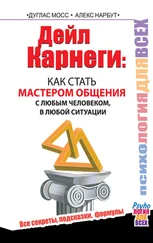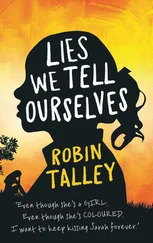Эндрю Карнеги - Autobiography of Andrew Carnegie
Здесь есть возможность читать онлайн «Эндрю Карнеги - Autobiography of Andrew Carnegie» — ознакомительный отрывок электронной книги совершенно бесплатно, а после прочтения отрывка купить полную версию. В некоторых случаях можно слушать аудио, скачать через торрент в формате fb2 и присутствует краткое содержание. Жанр: Биографии и Мемуары, foreign_antique, на английском языке. Описание произведения, (предисловие) а так же отзывы посетителей доступны на портале библиотеки ЛибКат.
- Название:Autobiography of Andrew Carnegie
- Автор:
- Жанр:
- Год:неизвестен
- ISBN:нет данных
- Рейтинг книги:3 / 5. Голосов: 1
-
Избранное:Добавить в избранное
- Отзывы:
-
Ваша оценка:
- 60
- 1
- 2
- 3
- 4
- 5
Autobiography of Andrew Carnegie: краткое содержание, описание и аннотация
Предлагаем к чтению аннотацию, описание, краткое содержание или предисловие (зависит от того, что написал сам автор книги «Autobiography of Andrew Carnegie»). Если вы не нашли необходимую информацию о книге — напишите в комментариях, мы постараемся отыскать её.
Autobiography of Andrew Carnegie — читать онлайн ознакомительный отрывок
Ниже представлен текст книги, разбитый по страницам. Система сохранения места последней прочитанной страницы, позволяет с удобством читать онлайн бесплатно книгу «Autobiography of Andrew Carnegie», без необходимости каждый раз заново искать на чём Вы остановились. Поставьте закладку, и сможете в любой момент перейти на страницу, на которой закончили чтение.
Интервал:
Закладка:
"His nose and chin they threatened ither."
As he tottered across the room toward me and laid his trembling hand upon my head he said: "And ye are the grandson o' Andra Carnegie! Eh, mon, I ha'e seen the day when your grandfaither and I could ha'e hallooed ony reasonable man oot o' his jidgment."
Several other old people of Dunfermline told me stories of my grandfather. Here is one of them:
One Hogmanay night 2 2 The 31st of December.
an old wifey, quite a character in the village, being surprised by a disguised face suddenly thrust in at the window, looked up and after a moment's pause exclaimed, "Oh, it's jist that daft callant Andra Carnegie." She was right; my grandfather at seventy-five was out frightening his old lady friends, disguised like other frolicking youngsters.
I think my optimistic nature, my ability to shed trouble and to laugh through life, making "all my ducks swans," as friends say I do, must have been inherited from this delightful old masquerading grandfather whose name I am proud to bear. 3 3 "There is no sign that Andrew, though he prospered in his wooing, was specially successful in acquisition of worldly gear. Otherwise, however, he became an outstanding character not only in the village, but in the adjoining city and district. A 'brainy' man who read and thought for himself he became associated with the radical weavers of Dunfermline, who in Patiemuir formed a meeting-place which they named a college (Andrew was the 'Professor' of it)." ( Andrew Carnegie: His Dunfermline Ties and Benefactions , by J.B. Mackie, F.J.I.)
A sunny disposition is worth more than fortune. Young people should know that it can be cultivated; that the mind like the body can be moved from the shade into sunshine. Let us move it then. Laugh trouble away if possible, and one usually can if he be anything of a philosopher, provided that self-reproach comes not from his own wrongdoing. That always remains. There is no washing out of these "damned spots." The judge within sits in the supreme court and can never be cheated. Hence the grand rule of life which Burns gives:
"Thine own reproach alone do fear."
This motto adopted early in life has been more to me than all the sermons I ever heard, and I have heard not a few, although I may admit resemblance to my old friend Baillie Walker in my mature years. He was asked by his doctor about his sleep and replied that it was far from satisfactory, he was very wakeful, adding with a twinkle in his eye: "But I get a bit fine doze i' the kirk noo and then."
On my mother's side the grandfather was even more marked, for my grandfather Thomas Morrison was a friend of William Cobbett, a contributor to his "Register," and in constant correspondence with him. Even as I write, in Dunfermline old men who knew Grandfather Morrison speak of him as one of the finest orators and ablest men they have known. He was publisher of "The Precursor," a small edition it might be said of Cobbett's "Register," and thought to have been the first radical paper in Scotland. I have read some of his writings, and in view of the importance now given to technical education, I think the most remarkable of them is a pamphlet which he published seventy-odd years ago entitled "Head-ication versus Hand-ication." It insists upon the importance of the latter in a manner that would reflect credit upon the strongest advocate of technical education to-day. It ends with these words, "I thank God that in my youth I learned to make and mend shoes." Cobbett published it in the "Register" in 1833, remarking editorially, "One of the most valuable communications ever published in the 'Register' upon the subject, is that of our esteemed friend and correspondent in Scotland, Thomas Morrison, which appears in this issue." So it seems I come by my scribbling propensities by inheritance—from both sides, for the Carnegies were also readers and thinkers.
My Grandfather Morrison was a born orator, a keen politician, and the head of the advanced wing of the radical party in the district—a position which his son, my Uncle Bailie Morrison, occupied as his successor. More than one well-known Scotsman in America has called upon me, to shake hands with "the grandson of Thomas Morrison." Mr. Farmer, president of the Cleveland and Pittsburgh Railroad Company, once said to me, "I owe all that I have of learning and culture to the influence of your grandfather"; and Ebenezer Henderson, author of the remarkable history of Dunfermline, stated that he largely owed his advancement in life to the fortunate fact that while a boy he entered my grandfather's service.
I have not passed so far through life without receiving some compliments, but I think nothing of a complimentary character has ever pleased me so much as this from a writer in a Glasgow newspaper, who had been a listener to a speech on Home Rule in America which I delivered in Saint Andrew's Hall. The correspondent wrote that much was then being said in Scotland with regard to myself and family and especially my grandfather Thomas Morrison, and he went on to say, "Judge my surprise when I found in the grandson on the platform, in manner, gesture and appearance, a perfect facsimile of the Thomas Morrison of old."
My surprising likeness to my grandfather, whom I do not remember to have ever seen, cannot be doubted, because I remember well upon my first return to Dunfermline in my twenty-seventh year, while sitting upon a sofa with my Uncle Bailie Morrison, that his big black eyes filled with tears. He could not speak and rushed out of the room overcome. Returning after a time he explained that something in me now and then flashed before him his father, who would instantly vanish but come back at intervals. Some gesture it was, but what precisely he could not make out. My mother continually noticed in me some of my grandfather's peculiarities. The doctrine of inherited tendencies is proved every day and hour, but how subtle is the law which transmits gesture, something as it were beyond the material body. I was deeply impressed.
My Grandfather Morrison married Miss Hodge, of Edinburgh, a lady in education, manners, and position, who died while the family was still young. At this time he was in good circumstances, a leather merchant conducting the tanning business in Dunfermline; but the peace after the Battle of Waterloo involved him in ruin, as it did thousands; so that while my Uncle Bailie, the eldest son, had been brought up in what might be termed luxury, for he had a pony to ride, the younger members of the family encountered other and harder days.
The second daughter, Margaret, was my mother, about whom I cannot trust myself to speak at length. She inherited from her mother the dignity, refinement, and air of the cultivated lady. Perhaps some day I may be able to tell the world something of this heroine, but I doubt it. I feel her to be sacred to myself and not for others to know. None could ever really know her—I alone did that. After my father's early death she was all my own. The dedication of my first book 4 4 An American Four-in-Hand in Great Britain. New York, 1888.
tells the story. It was: "To my favorite Heroine My Mother."
Fortunate in my ancestors I was supremely so in my birthplace. Where one is born is very important, for different surroundings and traditions appeal to and stimulate different latent tendencies in the child. Ruskin truly observes that every bright boy in Edinburgh is influenced by the sight of the Castle. So is the child of Dunfermline, by its noble Abbey, the Westminster of Scotland, founded early in the eleventh century (1070) by Malcolm Canmore and his Queen Margaret, Scotland's patron saint. The ruins of the great monastery and of the Palace where kings were born still stand, and there, too, is Pittencrieff Glen, embracing Queen Margaret's shrine and the ruins of King Malcolm's Tower, with which the old ballad of "Sir Patrick Spens" begins:
Читать дальшеИнтервал:
Закладка:
Похожие книги на «Autobiography of Andrew Carnegie»
Представляем Вашему вниманию похожие книги на «Autobiography of Andrew Carnegie» списком для выбора. Мы отобрали схожую по названию и смыслу литературу в надежде предоставить читателям больше вариантов отыскать новые, интересные, ещё непрочитанные произведения.
Обсуждение, отзывы о книге «Autobiography of Andrew Carnegie» и просто собственные мнения читателей. Оставьте ваши комментарии, напишите, что Вы думаете о произведении, его смысле или главных героях. Укажите что конкретно понравилось, а что нет, и почему Вы так считаете.
